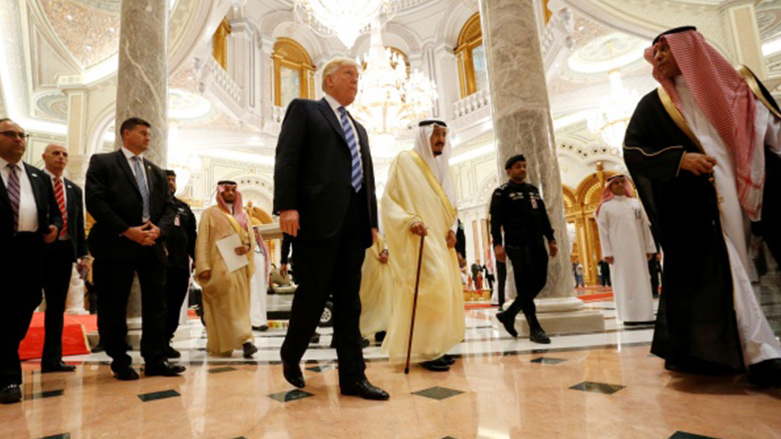US sides with Riyadh vs Ankara amid troubled visit of Turkish Foreign Minister to Washington

WASHINGTON DC (Kurdistan24) – Turkish Foreign Minister Mevlut Cavusoglu met on Tuesday with his US counterpart, Secretary of State Mike Pompeo, as well as National Security Adviser Amb. John Bolton, amid continued tensions in relations between the US and Turkey that appeared little resolved by his visit.
The October 2 murder of Saudi journalist Jamal Khashoggi inside the Saudi consulate in Istanbul was a major topic in Cavusoglu’s meeting with Pompeo, as the Turkish minister later told reporters.
Turkey, evidently, had listening devices implanted in the Saudi consulate that recorded the entire grisly affair. Over the past weeks, Turkey has slowly been releasing details, pressing the Saudis for an explanation that they have been unwilling to give.
But the Trump administration was not interested in hearing what Cavusoglu had to say. Even before his meetings ended, the White House released a statement denouncing the “crime” against Khashoggi, but affirming that the US “intends to remain a steadfast partner of Saudi Arabia.”
More generally, their meeting appeared far from cordial. Afterward, Pompeo and Cavusoglu held dueling press conferences, Pompeo at the State Department, where he addressed the State Department press corps, Cavusoglu at the Turkish embassy, where he spoke to Turkish reporters.
In his press conference, Pompeo stated that he “welcomed the positive momentum” in US relations with Turkey, following Ankara’s release of Pastor Andrew Brunson last month, before citing two issues still in dispute: “Turkey’s continued unjust detention” of “locally employed staff and citizens” at US diplomatic facilities, as well as “the Khashoggi case.”
They also discussed, as Pompeo explained, Syria and “the need to work together to de-escalate the conflict”—reference to an increasingly troubled cease-fire in Idlib Province, as well as “the reinvigoration of the UN-led peace process” there.
The US has other disagreements with Turkey, which Pompeo did not even mention.
Last week, State Department Spokesperson Heather Nauert issued a statement criticizing Turkey’s human rights record, specifically, its detention of “academics, journalists and civil society activists with ties to the Anatolia Culture Association (ACA.)”
Twelve such individuals were arrested on November 16 for their links to the ACA, which was founded by a Turkish businessman and philanthropist, Osman Kavala, who has been imprisoned for the past year.
Turkish President Recep Tayyip Erdogan has denounced Kavala as “Turkey’s Soros” for his efforts to promote liberalism and tolerance within Turkish society, including toward its minorities, particularly Kurds and Armenians.
The US also opposes Turkey’s plans to purchase Russia’s S-400 surface-to-air missile system. Last week, the State Department explained that Turkey had been warned that buying the S-400 could trigger US sanctions, as well as jeopardize its acquisition of the F-35, America’s newest fighter jet.
Finally, there is US support for the Kurdish-led Syrian Democratic Forces (SDF), America’s main partners in the fight against the Islamic State (IS) in Syria.
Although Pompeo did not mention the last two issues, Cavusoglu certainly did in his own press conference.
The Foreign Minister affirmed that Turkey’s purchase of the S-400 was a done deal and could not be canceled.
Cavusoglu also said that Turkey and the US would be discussing how to implement the “Manbij roadmap” in other areas of SDF-controlled Syria. US officials, however, have said nothing about applying the Manbij model east of the Euphrates River.
Cavusoglu also told Turkish journalists that he had given John Bolton a list of 84 associates of Fethullah Gulen, the exiled Turkish cleric, living in Pennsylvania, whom Ankara blames for the 2016 attempted coup. Turkey wants the 84 individuals extradited.
On Friday, it was reported that US President Donald Trump was looking for a way to extradite Gulen in exchange for Ankara’s easing up on its campaign against Riyadh.
However, the following day, Trump strongly denied the story. “It is not under consideration,” he said on Saturday.
The independence of the judiciary is a cardinal tenet of US democracy, and two savvy Washington insiders suggested to Kurdistan 24 that Trump’s statement was entirely credible.
Thus, it is hard to believe that the US will extradite Gulen, let alone, another 84 individuals associated with him.
Cavusoglu was in the US to attend a UN conference entitled the “Global Forum of the Alliance of Civilizations.” The conference has been held in various international capitals, on an irregular basis, since 2008. This year, it was held at UN headquarters in New York.
So why did the Turkish minister then come to Washington? From the respective statements of Pompeo and Cavusoglu, it does not appear that any significant progress was made on resolving the outstanding issues between the US and Turkey.
Editing by Nadia Riva
